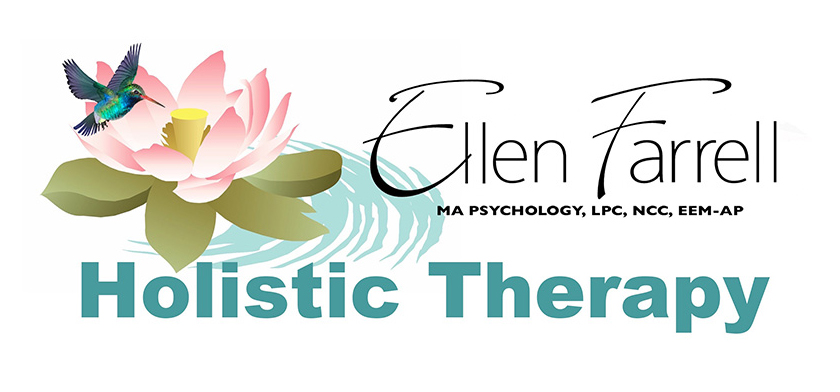Coping With Stress – Let the Love Flow
By Ellen Farrell, MA, NCC, LPC, EEM-AP
Coping with stress is best approached from a holistic perspective, with a focus on prevention. The holistic approach is an excellent complement to allopathic medicine, which holds an important place in the treatment of disease. Research shows that many positive effects result from a holistic approach (i.e., proper nutrition, exercise, spiritual connection, and finding meaning – through volunteerism, work, art, etc.) in dealing with the many stressors one may experience in life.
There is also increasing evidence that love and intimacy are “among the most powerful factors in health and illness.” According to research as compiled in Dr. Dean Ornish’ s book (1998), Love and Survival, The Scientific Basis for the Healing Power of Intimacy, intimacy is:
“at the root of what makes us sick and what makes us well, what causes sadness and what brings happiness, what makes us suffer and what leads to healing.” In fact, he states,
“I am not aware of any other factor in medicine – not diet, not smoking, not exercise, not stress, not genetics, not drugs, not surgery – that has a greater impact on our quality of life, incidence of illness, and premature death from all causes.”
Dr. Ornish states that the first step needed is “awareness, to be followed by meditation, compassion, altruism, group support, commitment, communication skills, psychotherapy/and forgiveness.” These are all “pathways to learning to open our hearts.”
Heart health involves more than monitoring cholesterol – it also reflects OUR EMOTIONAL AND SPIRITUAL HEART HEALTH.
We find meaning in life through our heart connection.
Although our facility for intimacy is paramount, diet and exercise are still key components of holistic health. One must be wary of research when it doesn’t support the relationship between health and the consumption of a high fiber, low fat diet – even when published in highly regarded journals such as the New England Journal of Medicine (NEJM). For instance, a study done in April of 2000, found that a high fiber, low fat diet did not protect against colon cancer.
As Dr. Ornish points out the participants’ fat intake was measured only by self-report, supposedly dropping from 36 to 24 percent – yet they lost, on average only one pound over four years, and their cholesterol levels “barely budged”. Reliable research tells us that a big drop in fat intake would result in a similar reduction of weight and cholesterol. Dr. Ornish states that since the reports were not verified it is doubtful, considering the outcome, that the self-reported information was valid. In general, a healthy diet means low fat (this is in my mind, what Dr. Ornish saw with his heart diseased patients – perhaps it could also have been the Type A over-work syndrome, and otherwise unhealthy eating habits that were the issue). Of course, eating a high fiber diet with complex carbs, and a variety of fruits and vegetables is always good – the less processed, the better! I also want to point out that sugar levels were not measured!
Current research differentiates between good and bad fats. Bad are hydrogenated, or otherwise rancid, or degraded in production. Best is organic EEVO or coconut oil, for example. We need fats, such as from nuts, seeds, avocadoes, etc. – just not from junk food. No one needs excess fried foods (oil may be rancid/ not changed daily in some chain restaurants), or chemically processed and sprayed vegetable oils, like corn, canola, cottonseed, or soy.
There are some differences in defining specific food choices that ultimately define “healthy” for the individual – ethical/environmental food choices, body type/dosha, yin/yang balance, age, physiological and genetic variables – we are each unique! Of course, as we age and enter our 30’s and 40’s, and beyond, our metabolism slows. According to Dr. Pamela Peeke, “Women over the age of forty do not require (as much) dense complex carbohydrates (pasta, bread, potatoes, oats, rice, etc.) after 5 p.m. <evening meal>” This does not mean to go to an extreme of cutting all carbs!! We especially need those good whole grain carbohydrates at breakfast – so don’t skip it (or at least, check with your medical provider), but consider adding non-GMO, and especially organic, as many carbs are heavily sprayed at harvest with toxic chemicals! Did you know that cortisol, the stress hormone is activated when we stress ourselves by starving our bodies, as in skipping breakfast, or going more than 2-5 hours without eating?
Dr. Peeke has many good tips on her website, and the article quoted above is from “10 Toxic Weight Prevention Tips Every Woman Needs to Know“.
An intention to be healthy also manifests through exercise, which:
- makes our bodies stronger by increasing blood supply to the brain – as we age, working out improves cognitive abilities;
- exercise can reverse the negative characteristics of aging;
- psychological benefits of exercise: “improved self-esteem, body concept, family relations, memory, concentration, more energy, better sleep.”
- increases of nor-epinephrine from regular exercise overcome depression;
- in fact, it was found that a 15-minute walk provided more relaxation than a standard mild tranquilizer!
Research shows that three factors of a good exercise program usually include:
the time (best in AM, prior to eating);
Supplementation;
Type of exercise (20 minutes cardio/weights–preceded by a 20–30 minute meditative walk).
A balanced life includes a balanced diet, exercise, and individual stress management/group support. Making this a priority allows space for that all-important love and intimacy, known as the foundation of lasting heart health – and overall health!
This article was originally printed in the SCAD Campus Chronicle, where Ellen was a counselor from 2000-2006. It was updated in 2016.


